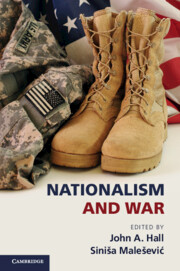Introduction
Wars and nationalisms
Published online by Cambridge University Press: 05 April 2013
Summary
There is almost certainly a consensus in the general public that nationalism causes war. In an immediate sense this is, as both Michael Mann and Siniša Malešević point out in their contributions, quite wrong: wars had been fought for thousands of years before the advent of nationalism. Still, it is easy to see why nationalism is seen as likely to cause war once it gains salience in the historical record. If nationalism insists that one live with members of one's nation in a state free from alien rule, then avenues to violence open up immediately. Members of the nation left outside the state should be brought in and untrustworthy elements within expelled, with secession from imperial rule being all but mandatory. Europe's hideous twentieth century makes it only too easy to recognize these forces, all capable of leading to organized brutality. And at a more general level is it not simply the case that there is a link between the viciousness of modern war and the emergence of nationalism? Data on the causes of war in modern times collected by Kalevi Holsti and by Andreas Wimmer (whose contribution to this whole field, as we shall see, has been very great) certainly seem to show that the institutional change from empire to nation-state does a great deal to explain the incidence of war (Holsti 1991; Wimmer and Min 2006, 2009).
The essays in this volume, written by historians as well as social scientists, evaluate this claim and its corollaries, adding necessary complexities and seeking to specify mechanisms at work in different historical and geographical contexts. The purpose of this introduction is to specify the state of play within an intellectual field of great moral and political importance – one that is currently at the center of attention in social studies as a whole. That this specification involves commenting on the contributions of the participants of the volume is no accident; their chapters were solicited precisely to exemplify the condition of current scholarship, and thereby to crystallize understanding so as to set the agenda for future research.
- Type
- Chapter
- Information
- Nationalism and War , pp. 1 - 28Publisher: Cambridge University PressPrint publication year: 2013
References
- 2
- Cited by



